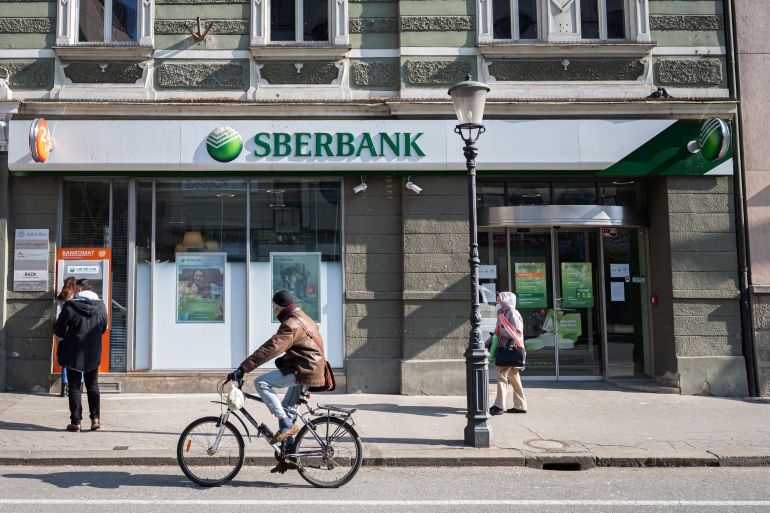Russia’s biggest lender Sberbank exits Europe
State-controlled bank announces it is pulling out of European markets amid tightening of Western sanctions following Ukraine invasion.

Russia’s largest lender Sberbank says it is pulling out of Europe after coming under pressure from tough sanctions announced by Western countries in response to Moscow’s invasion of Ukraine.
“In the current environment, Sberbank has decided to withdraw from the European market,” it said on Wednesday in a statement carried by Russian news agencies.
Keep reading
list of 3 itemsUS stocks fall, oil tops $105 as Ukraine crisis rattles markets
UN launches $1.7bn aid appeal for Ukraine amid Russian assault
The state-controlled bank’s European subsidiaries were experiencing “abnormal cash outflows and threats to the safety of employees and branches”, it added.
The bank said it was no longer able to supply liquidity to European subsidiaries, following a central bank order, but its capital level and asset quality were sufficient to pay all depositors.
The news came as Sberbank reported record annual profits for 2021.
European Union sanctions
Ukraine says hundreds of civilians, including children, have been killed since Russian troops rolled into the country last week to achieve President Vladimir Putin’s mission of overthrowing the pro-Western government of President Volodymyr Zelenskyy. The Kremlin says it does not target civilian infrastructure during what it calls a “special operation”.
The unprecedented steps taken by Western nations to isolate Russia’s economy and financial system over the invasion have included sanctions on its central bank and the exclusion of some of its lenders from the global payments system, SWIFT.
The European Central Bank had already ordered the closure of Sberbank’s European arm, after warning it faced failure because of a run on its deposits sparked by the backlash to the war.
Sberbank, which had operations in Austria, Croatia, Germany and Hungary among other nations, had European assets worth 13 billion euros ($14.4bn) as of December 31, 2020.
Sberbank’s Austria-based European arm, Sberbank Europe AG, would be allowed to enter “normal insolvency proceedings”, while branches in Croatia and Slovenia were sold to local banks, ECB said.
Slovenian bank NLB said it was acquiring Sberbank’s Slovenian unit.
The exit does not affect the bank’s operations in Switzerland.
Sberbank’s net profit for 2021 jumped 64 percent year on year to 1.25 trillion roubles ($12.38bn). Return on equity for the year was 24.2 percent and its net interest income stood at 1.8 trillion roubles.
The Moscow Exchange has halted trading on stocks and sought to prevent capital outflows from Russian assets, but Sberbank’s depositary receipts in London have lost their entire value, falling to $0.